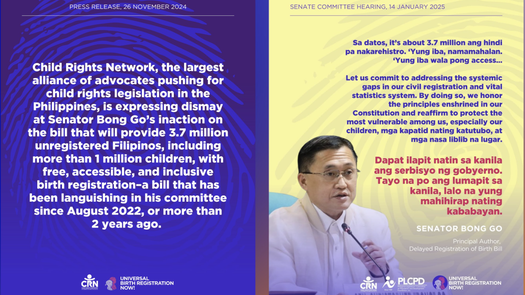July 29, 2025
October 26, 2023
Engaging Civil Society Organizations for Equitable Civil Registration Systems and Budgets

In an important expansion of its Data for Health (D4H) program, the Global Health Advocacy Incubator (GHAI) will begin working with civil society organizations (CSOs) to support advocacy efforts to mobilize political will and public demand for civil registration and vital statistics (CRVS) system improvements. As the advocacy partner of the Bloomberg Philanthropies D4H Initiative, GHAI will provide catalytic technical assistance and financing to local CSOs in five countries in the first phase – Bangladesh, India, Indonesia, Philippines and Uganda – to plan and execute strategic advocacy campaigns that push for stronger CRVS systems, laws, policies, and in some cases, increased budgets.
D4H partner organizations work with governments to strengthen and standardize birth and death records to better inform policymaking and improve public health outcomes. This involves assessing the current systems to identify gaps and advising on best practices, which includes programs led by GHAI to review countries’ CRVS legal framework, provide assistance with legal reforms, and support budget advocacy and funding sustainability.
CRVS systems are the foundational bedrock upon which all public health interventions are built. Without robust and complete population data, or data on where, how and why deaths occur, governments cannot plan effective public health programs or strategies. Registration of births and deaths is also of critical importance to individuals. Where people are not registered, they remain invisible in their governments’ eyes for services and public health interventions, and cannot access the rights, protections or social benefits that civil registration unlocks.
Politicians and decision-makers in government do not always recognize the importance of these systems for improving public health. Though many countries have demonstrated strong commitment and leadership in strengthening their CRVS systems, these systems continue to under-register births and deaths in many countries around the world due to legal, structural and funding deficiencies. Those most likely to be unregistered and lack a legal identity are marginalized populations, including migrants and displaced persons, people with disabilities, women and girls, the ultra-poor, ethnic minorities and Indigenous Peoples. These individuals may struggle to access registration services or may not trust that registration is to their benefit or that governments will protect their data.
Now, for the first time, GHAI’s proven model of advocacy will be used to seek policy change to improve CRVS systems and to educate CSOs about this important subject so that they can increase public demand for access to civil registration services and ensure that their local knowledge and expertise is taken into account.
To achieve sustainable transformation of CRVS systems in complex political environments, engaging civil society will be a key ingredient for success. CSOs can push the agenda for CRVS law and financing reform in places where it has stalled and drive public demand for high-quality CRVS services, alongside and in dialogue with government.
GHAI has a rich and proud history of engaging civil society to achieve policy wins on many public health issues, including tobacco control, epidemic preparedness, immunization, cardiovascular health, food and nutrition and road safety. The GHAI Data for Health Program team will leverage our deep global CSO experience and networks to advance CRVS reform and system improvement, as well as build public trust and demand for civil registration services. We welcome the opportunity to support CSOs in Africa and Asia and the Pacific to ensure they have the resources and capabilities to push for CRVS systems that count everyone, everywhere.



